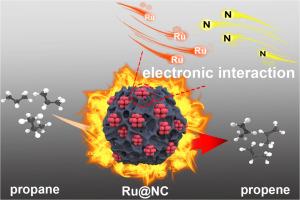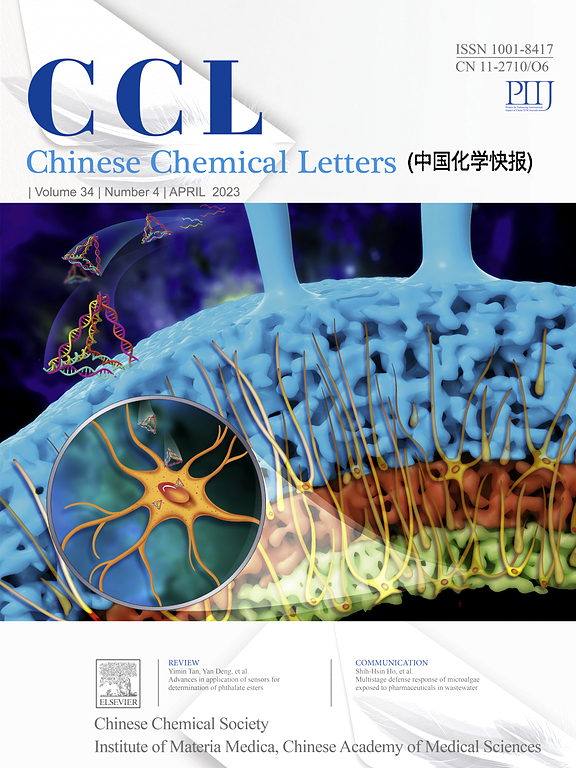锚定在多孔掺氮碳基体上的 Ru 纳米粒子催化的高效丙烷脱氢反应
IF 9.4
1区 化学
Q1 CHEMISTRY, MULTIDISCIPLINARY
引用次数: 0
摘要
丙烷脱氢(PDH)是生产丙烯的重要工业工艺,主要使用铬基或铂基催化剂。这些催化剂经常面临各种挑战,例如铬的毒性、铂等贵金属的高成本以及在高温下烧结或形成焦炭导致的失活问题。我们介绍了一种特殊的 Ru 基催化剂--锚定在掺氮碳基体上的 Ru 纳米颗粒(Ru@NC),它在 550 °C 时的丙烷转化率达到 32.2%,丙烯选择性达到 93.1%,同时焦炭沉积极少,失活率低至 0.0065 h-1。利用 TEM 和 XPS 等技术进行的表征以及精心设计的对照实验表明,Ru@NC 的显著性能源于氮掺杂改变了 Ru 的电子状态以及基质的微孔性质,使其成为最先进的 PDH 催化剂中的佼佼者。本文章由计算机程序翻译,如有差异,请以英文原文为准。

Efficient propane dehydrogenation catalyzed by Ru nanoparticles anchored on a porous nitrogen-doped carbon matrix
Propane dehydrogenation (PDH) is a vital industrial process for producing propene, utilizing primarily Cr-based or Pt-based catalysts. These catalysts often suffer from challenges such as the toxicity of Cr, the high costs of noble metals like Pt, and deactivation issues due to sintering or coke formation at elevated temperatures. We introduce an exceptional Ru-based catalyst, Ru nanoparticles anchored on a nitrogen-doped carbon matrix (Ru@NC), which achieves a propane conversion rate of 32.2 % and a propene selectivity of 93.1 % at 550 °C, with minimal coke deposition and a low deactivation rate of 0.0065 h−1. Characterizations using techniques like TEM and XPS, along with carefully-designed controlled experiments, reveal that the notable performance of Ru@NC stems from the modified electronic state of Ru by nitrogen dopant and the microporous nature of the matrix, positioning it as a top contender among state-of-the-art PDH catalysts.
求助全文
通过发布文献求助,成功后即可免费获取论文全文。
去求助
来源期刊

Chinese Chemical Letters
化学-化学综合
CiteScore
14.10
自引率
15.40%
发文量
8969
审稿时长
1.6 months
期刊介绍:
Chinese Chemical Letters (CCL) (ISSN 1001-8417) was founded in July 1990. The journal publishes preliminary accounts in the whole field of chemistry, including inorganic chemistry, organic chemistry, analytical chemistry, physical chemistry, polymer chemistry, applied chemistry, etc.Chinese Chemical Letters does not accept articles previously published or scheduled to be published. To verify originality, your article may be checked by the originality detection service CrossCheck.
 求助内容:
求助内容: 应助结果提醒方式:
应助结果提醒方式:


